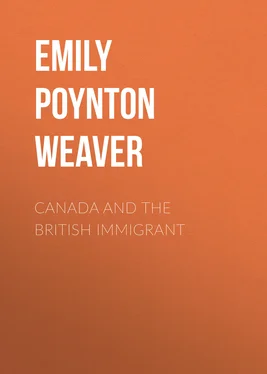Emily Poynton Weaver - Canada and the British immigrant
Здесь есть возможность читать онлайн «Emily Poynton Weaver - Canada and the British immigrant» — ознакомительный отрывок электронной книги совершенно бесплатно, а после прочтения отрывка купить полную версию. В некоторых случаях можно слушать аудио, скачать через торрент в формате fb2 и присутствует краткое содержание. Жанр: Путешествия и география, История, foreign_edu, foreign_antique, foreign_prose, на английском языке. Описание произведения, (предисловие) а так же отзывы посетителей доступны на портале библиотеки ЛибКат.
- Название:Canada and the British immigrant
- Автор:
- Жанр:
- Год:неизвестен
- ISBN:нет данных
- Рейтинг книги:3 / 5. Голосов: 1
-
Избранное:Добавить в избранное
- Отзывы:
-
Ваша оценка:
- 60
- 1
- 2
- 3
- 4
- 5
Canada and the British immigrant: краткое содержание, описание и аннотация
Предлагаем к чтению аннотацию, описание, краткое содержание или предисловие (зависит от того, что написал сам автор книги «Canada and the British immigrant»). Если вы не нашли необходимую информацию о книге — напишите в комментариях, мы постараемся отыскать её.
Canada and the British immigrant — читать онлайн ознакомительный отрывок
Ниже представлен текст книги, разбитый по страницам. Система сохранения места последней прочитанной страницы, позволяет с удобством читать онлайн бесплатно книгу «Canada and the British immigrant», без необходимости каждый раз заново искать на чём Вы остановились. Поставьте закладку, и сможете в любой момент перейти на страницу, на которой закончили чтение.
Интервал:
Закладка:
In connection with the colleges and universities are short courses—in England they would probably be called “University Extension” lectures—on agriculture and subjects related to the farm, especially designed for the benefit of dairymen, threshermen, housewives, beekeepers, etc., etc. The imparting of the special knowledge to make a scientific instead of a blundering amateur “thresherman” fits in oddly at first sight with one’s preconceived notions of a university; but why should the extension downward in such utilitarian directions—the striking deep of its roots into the common earth—prevent a great educational institution flowering freely in the higher realms of science and art and philosophy?
There is another aspect to the case. I was much interested, a few months ago, on a chance conversation in a train with an old western farmer of rugged aspect, by his remark that the institution of college and university courses in agriculture would tend to raise the young fellows of the farming classes in their own eyes and in those of other people, and would also enable them better to hold their proper place in the country. (I give the substance of his remarks, not his words.) Now, it is a fact that the Canadian farmer is, as a rule, a much less self-assertive and a more retiring being than his brother—the doctor, the merchant, the manufacturer, the lawyer or the politician, as the case may be; and sometimes his interests suffer on account of his modesty. Nevertheless, there are not a few men amongst the farmers who are of excellent intellectual capabilities. They are men who think, moreover, and some day, now that they are beginning to organize themselves, the result of their thinking will have considerably more effect on the public life of the Dominion than it has had hitherto.
In the various provinces there has been a widespread movement of late years in the direction of the formation of farmers and country-women’s clubs or institutes, which not only serve as a means for the dissemination of information, but give a much-needed stimulus to the social life of thinly settled districts, where hitherto (in the case of the women especially) the churches have been the chief social factor.
The churches will continue, both in town and country, to be of account in the social side of life, apart from their primary importance as definite religious agencies. According to the latest census there were in Canada over 2,833,000 adherents of the Roman Catholic church, which gains immense strength from its solidarity. The Protestants, on the other hand, though stronger numerically, are split up into numerous divisions, and in hundreds of little villages throughout the Dominion, there are three or four churches of different denominations, whilst numberless other places have no church at all. This over-lapping adds immensely to the toils, and perhaps detracts from the efficiency, of the country ministers and missionaries as a body. But projects of union are in the air, and there is hope that the several great Protestant churches may devise some plan of working together much more than has been done hitherto, even if they do not accomplish the corporate union which many of their adherents desire. In numerical strength the Protestant churches come in the following order:—Presbyterians, Methodists, Anglicans, Baptists, and a large number of smaller organizations. Apart from definite efforts by the churches themselves to arrive at some basis of union, there are numerous inter-denominational associations which are tending towards unity. One of the most notable of these is the organized effort, known as the “Laymen’s Missionary Movement,” to arouse the interest of business men in missions. This organization, first started in the United States, has resulted in largely increased giving for missionary purposes.
The immense immigration to Canada of foreigners and others necessitates constantly increasing effort on the part of the churches to keep abreast of their duties and opportunities; and amongst the numbers of newcomers there is much call to foreign missionary work within the borders of the Dominion, if it is to remain, in anything more than name, a Christian country. For instance, Montreal and Toronto each have thousands of Jewish citizens, many of them from Russia and other foreign lands. Galicians, adherents of the Greek Church, are numerous in the prairie provinces; and there are over fifteen thousand Mormons in Canada, chiefly in Alberta and Ontario. As farmers they are said to be excellent settlers; whether or not they will be equally successful in sowing the seeds of their distinctive tenets, so degrading to women and to the sanctity of home life, yet remains to be seen. It is, however, only fair to add that the Mormons in Canada do not, as in Utah, practise polygamy openly.
In British Columbia, and to a less extent throughout Canada, are to be found numbers of quiet, industrious Chinamen, working on the railways, in the hotels of the West, in the canning factories of the Pacific Coast, and in laundries from Victoria to Halifax. Despite the heavy head tax of $500 (£100) on each newcomer, no less than 6,083 Chinamen came to Canada in a recent year. Amongst them are very few women; but a number of young boys have recently been brought out by their relatives to attend the public schools, with a view to their learning English and the “Western learning” that goes with it.
The records of the British and Foreign Bible Society are suggestive in connection with the influx of foreigners into the Dominion. In 1912 sales were made of the Bible, or portions of it, in 44 languages in Toronto alone; and of 110 languages in all Canada. The earliest foreign version of the Scriptures issued by the Bible Society in its first year—1804—was, by the way, that intended for the Mohawk Indians in Canada. Many organizations, such as the Women’s Christian Temperance Union, the Young Men’s and Young Women’s Christian Associations and the Salvation Army are doing their useful work all over Canada. There is indeed great scope for such organizations, for the Dominion is full of young people and friendless strangers, who in their loneliness are in great need of a helping hand.
But constantly fresh districts open beyond the reach of the churches and philanthropic agencies, and here the need is for individuals whose Christianity is deep enough to stand the hard test of isolation. Many immigrants (so-called Christian), when deprived of church services and the influences of old days, seem to forget their faith. But to those who hold fast their religion under the new trials may come the reward of giving an uplift to, and stamping a Christian character upon, a whole community. Indeed, a neighbourhood often reflects for years the type of its earlier settlers.
V
INDUSTRIES AND TRANSPORT
THE most important industry of Canada is, of course, agriculture, which employs nearly twice as many people as any other class of industries, and has a greater annual product. With comparatively few exceptions, the farmers of Canada own their own land. Considered from the point of view of its returns, the greatest crop is wheat. Saskatchewan ranks first as a wheat-growing province; Manitoba and Alberta coming respectively second and third. In the older provinces the farmers are going in to a great extent for mixed farming, and for the raising of apples and other fruit. British Columbia is also giving much attention to the fruit industry. At present many of the prairie farms are devoted solely to the growing of grain; but already the leaders of the agricultural world of the Dominion are urging the extension of “mixed farming,” for the sake of saving the fertile soil from exhaustion and for the simplification of the labour problem, which is aggravated by the crowding of all the work of the farms into a few brief weeks of summer.
Читать дальшеИнтервал:
Закладка:
Похожие книги на «Canada and the British immigrant»
Представляем Вашему вниманию похожие книги на «Canada and the British immigrant» списком для выбора. Мы отобрали схожую по названию и смыслу литературу в надежде предоставить читателям больше вариантов отыскать новые, интересные, ещё непрочитанные произведения.
Обсуждение, отзывы о книге «Canada and the British immigrant» и просто собственные мнения читателей. Оставьте ваши комментарии, напишите, что Вы думаете о произведении, его смысле или главных героях. Укажите что конкретно понравилось, а что нет, и почему Вы так считаете.


![О Генри - Граф и свадебный гость [Черное платье] [The Count and the Wedding Guest]](/books/405331/o-genri-graf-i-svadebnyj-gost-chernoe-plate-th-thumb.webp)









